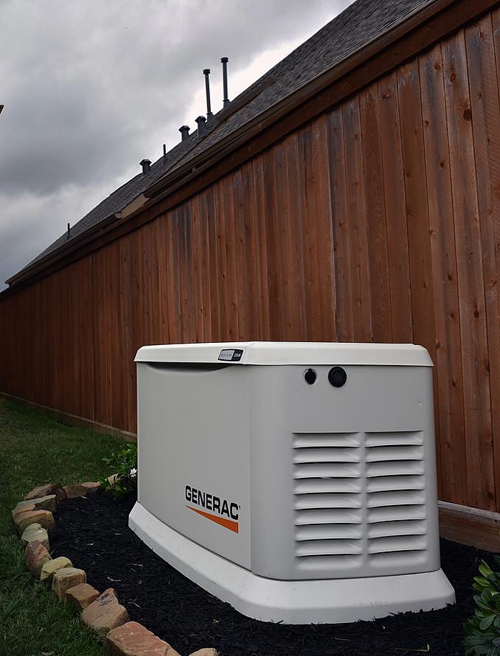Generator Backup Systems
- Automatic power back-up for loss of power
- Portable back-up generators for loss of power
- Generator maintenance services
Generator Backup Systems
 We rely greatly on electricity to power our lives, which makes power outages quite an inconvenience. Whether you lose power from bad weather or a traffic accident, installing a home backup generator will save you from the hassle of going without power.
We rely greatly on electricity to power our lives, which makes power outages quite an inconvenience. Whether you lose power from bad weather or a traffic accident, installing a home backup generator will save you from the hassle of going without power.
Here are some fundamental differences between standby and portable generators. A standby generator is permanently installed outside the home similar to a central air conditioning unit, while a portable generator can be moved from location to location.
Standby generators turn on automatically when the power shuts off.
A standby generator is a back-up electrical system that operates automatically. Within seconds of a utility outage an automatic transfer switch senses the power loss, commands the generator to start and then transfers the electrical load to the generator. The standby generator begins supplying power to the circuits.
Portable generators and home standby generators perform the same basic tasks. But the two types couldn’t be farther apart when it comes to cost and convenience.
All portable models tend to be noisier and produce less power than standby models, and they need to be wheeled out of storage, connected to your home’s circuit-breaker panel, and manually fired up in the event of an outage. If you use one during inclement weather, such as a rainstorm—likely during a power outage—you’ll need to protect your generator from the elements with a model-specific cover or a freestanding canopy.
Home standby generators, also called stationary generators, are permanently installed by a pro and have insulated weatherproof housing that keeps them relatively quiet.
The big advantages are that they kick on automatically when the lights go out and they can power everything in your home at once.
Plus they run on natural gas or propane, which means they can operate for days or weeks on a full whole-house propane tank, or indefinitely in the case of natural-gas versions.
“Home standby generators are expensive but they’re the gold standard in backup power, and they outperform all other types of generators in our ratings,” says Dave Trezza, who oversees generator testing for Consumer Reports. “If you can afford it, I’d tell you to pick a home standby generator every time.”
Here are some pros and cons of each type of generator.
Portable Generators
Pros: Portable generators are cheaper to buy and install than home standby models. When connected to your home’s circuit-breaker panel with a manual transfer switch, they can power almost as much as a home standby generator. They have built-in outlets for directly connecting suitable extension cords if you haven’t installed a transfer switch.
Cons: You’ll need to wheel your generator out of storage, connect it to your transfer switch, and fire it up each time you experience an outage. Portable models also require you to store large quantities of gasoline, mixed with fuel stabilizer, to get through a prolonged outage. They tend to be noisier and have lower output than home standby models.
Home Standby Generators
Pros: Home standby generators are largely worry-free. They’re typically sized to power an entire house in the event of an outage, and they come on automatically. They can run for days or weeks without refueling, they tend to be very quiet, and you don’t need to fuss with weather covers.
Cons: Home standby generators are pricier to buy, and installation costs can range from a few thousand dollars to $10,000 or more.
Williamson Electric will provide you with a consultation to determine your needs and which type of generator is right for you. This might include an automatic stand-by system (whole house) or a portable generator system. Additionally, we will determine the correct size for your power needs and the proper location for your generator installation.
Williamson Electric is the experienced electrical contractor you can talk to about all your electrical needs and questions.
Click Here or call for an appointment at 215-368-1815.

